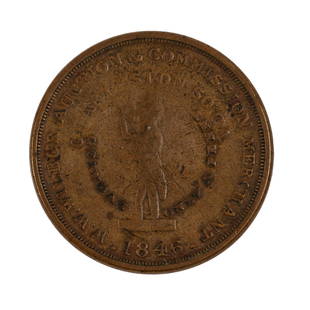
1745 Dr David Hartley Medicine for Bladder Stones
Similar Sale History
View More Items in Books, Magazines & Papers
Related Books, Magazines & Papers
More Items in Books, Magazines & Papers
View MoreRecommended Collectibles
View More









Item Details
Description
Colonial America
1745 Instructions for Preparing and Administering Mrs. Stephens's Medicine for "Bladder Stones" by Dr. David Hartley
Sept. 9, 1745-Dated, Colonial Period English Physician and Philosopher David Hartley's Manuscript Instructions for Preparing and Administering a Medicine for Dissolving Bladder Stones, 5+ pages, Choice Very Fine.
Original 18th century Hnadwritten Manuscript, 5+ pages, measuring 5-3/8" x 8-1/2", titled: "Directions for preparing and administering Mrs. Stephens's Medicine for the Stone, in a Solid form. By Dr. Hartley", and dated Sept. 9, 1745.
David Hartley, (1705-1757), was an English physician and philosopher. In the mid 1730's he began suffering from bladder stones and thought that a Mrs. Joanna Stephens had developed an oral medicine that could dissolve the stones in situe, and in 1738, he published, "Ten Cases of Persons Who Have Taken Mrs. Stephens's Medicines for the Stone", which included a detailed account of the agonies he had suffered with bladder stones. He worked on determining the ingredients in Mrs. Stephens' medicine, and made them public so all could benefit. He also persuaded Parliament to award her 5,000 Pounds.
This early Colonial era manuscript details step by step how to make the medicine, which included quick lime, soap, and salt of tartar, and how it should be taken, both to dissolve stones and to prevent their forming. A scarce Colonial medical manuscript.
HARTLEY, DAVID (1705"1757)
David Hartley, the association psychologist and moral philosopher, was born in Luddenden, Halifax, England, and was educated at the Bradford grammar school and Jesus College, Cambridge. He was elected a fellow of Jesus but lost his fellowship when he married. He did not take holy orders, probably because of doctrinal scruples.
Although he never received a medical degree either, he became a physician and practiced medicine in, successively, Newark, Bury St. Edmunds, London, and Bath. He was a friend of bishops Butler, Law, and Warburton.
Hartley's contribution to philosophy is his treatise Observations on Man, His Frame, His Duty and His Expectations (London, 1749). The first part, called "Observations on the Frame of the Human Body and Mind," is Hartley's exposition of the doctrines of vibration, association, and the seven classes of intellectual pleasures and pains.
The second part, called "Observations on the Duty and Expectations of Mankind," consists of arguments for the existence of God, a defense of the truth of Christianity, a set of rules of conduct, and an estimate of our legitimate expectations in this life and hereafter.
Hartley's merit lies not in innovation but in consolidation. Borrowing several doctrines from his predecessors, he offers a comprehensive account of human nature. He treats mind and body as parts of a coordinate system capable of influencing each other. Thus, his work is a mixture of speculative physiology and psychology. While his conclusions may be criticized for their lack of an experimental basis (although he appeals frequently to experience), he nonetheless deserves credit for supporting the conceptual ideal of a unitary system of mind and body. Hartley's theory of knowledge is John Locke's, offered in a context of religious sentiment.
Despite the role that association plays in Hartley's philosophy, there is no mention of David Hume in his pages. By freeing the doctrines of learning by experience and of psychological association from skeptical associations, Hartley gave them a respectability that assured them a general currency.
The three aspects of human nature that Hartley wished to explain are sensation, motion, and the generation of ideas. With regard to sensation, he wanted to account for the way in which impressions on the senses register perceptions in the mind. He postulated, first, that the "white medullary substance" of the brain, the spinal marrow, and nerves is the immediate instrument of sensation. He then claimed that when an external object is impressed on the senses, it occasions, first in the nerves linking the senses and the brain and then in the brain, vibrations of the infinitesimal medullary particles. These vibrations are the means of conveying the sensation to the brain.
1745 Instructions for Preparing and Administering Mrs. Stephens's Medicine for "Bladder Stones" by Dr. David Hartley
Sept. 9, 1745-Dated, Colonial Period English Physician and Philosopher David Hartley's Manuscript Instructions for Preparing and Administering a Medicine for Dissolving Bladder Stones, 5+ pages, Choice Very Fine.
Original 18th century Hnadwritten Manuscript, 5+ pages, measuring 5-3/8" x 8-1/2", titled: "Directions for preparing and administering Mrs. Stephens's Medicine for the Stone, in a Solid form. By Dr. Hartley", and dated Sept. 9, 1745.
David Hartley, (1705-1757), was an English physician and philosopher. In the mid 1730's he began suffering from bladder stones and thought that a Mrs. Joanna Stephens had developed an oral medicine that could dissolve the stones in situe, and in 1738, he published, "Ten Cases of Persons Who Have Taken Mrs. Stephens's Medicines for the Stone", which included a detailed account of the agonies he had suffered with bladder stones. He worked on determining the ingredients in Mrs. Stephens' medicine, and made them public so all could benefit. He also persuaded Parliament to award her 5,000 Pounds.
This early Colonial era manuscript details step by step how to make the medicine, which included quick lime, soap, and salt of tartar, and how it should be taken, both to dissolve stones and to prevent their forming. A scarce Colonial medical manuscript.
HARTLEY, DAVID (1705"1757)
David Hartley, the association psychologist and moral philosopher, was born in Luddenden, Halifax, England, and was educated at the Bradford grammar school and Jesus College, Cambridge. He was elected a fellow of Jesus but lost his fellowship when he married. He did not take holy orders, probably because of doctrinal scruples.
Although he never received a medical degree either, he became a physician and practiced medicine in, successively, Newark, Bury St. Edmunds, London, and Bath. He was a friend of bishops Butler, Law, and Warburton.
Hartley's contribution to philosophy is his treatise Observations on Man, His Frame, His Duty and His Expectations (London, 1749). The first part, called "Observations on the Frame of the Human Body and Mind," is Hartley's exposition of the doctrines of vibration, association, and the seven classes of intellectual pleasures and pains.
The second part, called "Observations on the Duty and Expectations of Mankind," consists of arguments for the existence of God, a defense of the truth of Christianity, a set of rules of conduct, and an estimate of our legitimate expectations in this life and hereafter.
Hartley's merit lies not in innovation but in consolidation. Borrowing several doctrines from his predecessors, he offers a comprehensive account of human nature. He treats mind and body as parts of a coordinate system capable of influencing each other. Thus, his work is a mixture of speculative physiology and psychology. While his conclusions may be criticized for their lack of an experimental basis (although he appeals frequently to experience), he nonetheless deserves credit for supporting the conceptual ideal of a unitary system of mind and body. Hartley's theory of knowledge is John Locke's, offered in a context of religious sentiment.
Despite the role that association plays in Hartley's philosophy, there is no mention of David Hume in his pages. By freeing the doctrines of learning by experience and of psychological association from skeptical associations, Hartley gave them a respectability that assured them a general currency.
The three aspects of human nature that Hartley wished to explain are sensation, motion, and the generation of ideas. With regard to sensation, he wanted to account for the way in which impressions on the senses register perceptions in the mind. He postulated, first, that the "white medullary substance" of the brain, the spinal marrow, and nerves is the immediate instrument of sensation. He then claimed that when an external object is impressed on the senses, it occasions, first in the nerves linking the senses and the brain and then in the brain, vibrations of the infinitesimal medullary particles. These vibrations are the means of conveying the sensation to the brain.
Buyer's Premium
- 30%
1745 Dr David Hartley Medicine for Bladder Stones
Estimate $350 - $700
1 bidder is watching this item.
Shipping & Pickup Options
Item located in Rancho Santa Fe, CA, usOffers In-House Shipping
Payment

Related Searches
TOP


























![[CIVIL RIGHTS]. KING, Dr. Martin Luther, Jr.: [CIVIL RIGHTS]. KING, Dr. Martin Luther, Jr. (1929–1968). Where Do We Go From Here: Chaos or Community? New York: Harper & Row, 1967. 8vo. Original publisher’s black and yellow cloth, gilt](https://p1.liveauctioneers.com/928/233968/121082024_1_x.jpg?height=310&quality=70&version=1642540108)





![[Literature] Stevenson, Robert Louis Strange Case of Dr Jekyll and Mr Hyde: [Literature] Stevenson, Robert Louis Strange Case of Dr Jekyll and Mr Hyde New York: Charles Scribner's Sons, 1886. First edition ("Authorized Edition"). 8vo. (viii), 138, (2), (4) (ads) pp. Original](https://p1.liveauctioneers.com/65/259470/135047525_1_x.jpg?height=310&quality=70&version=1661539042)
































![19 issues of rare Gay Magazine METRA 1985-1986: [Queer interest], Metra: Midwest America's Leading Free Gay Magazine, 19 issues, published 1986-1987, a few duplicates, softcover, staplebound wraps, illustrated throughout in black and white, publish](https://p1.liveauctioneers.com/184/328649/177016396_1_x.jpg?height=310&quality=70&version=1714770323)









![George Washington Signed Discharge: Partly printed discharge document signed by George Washington, as Commander in Chief of the Armies of the United States. Newburgh, [New York], 4 January 1783. 1 page, ## x ## in. Undersigned by Washin](https://p1.liveauctioneers.com/7226/322253/173251475_1_x.jpg?height=310&quality=70&version=1710004847)
![[Ambrotype] Texas Confederate Soldier: Sixth plate ambrotype. Full leatherette case. Portrait of a possible Texas Confederate soldier. A silver star device was used to pin up the brim of his light-toned headgear, a look often seen in image](https://p1.liveauctioneers.com/7226/322253/173251509_1_x.jpg?height=310&quality=70&version=1710004847)


![Captured Bowie Knife w/ Period Note of Provenance: Captured Confederate D-hilt Bowie knife. [Kenansville, North Carolina]: [Louis Froelich factory]. With original metal and leather sheath with affixed period notes. First note with only remnants. Secon](https://p1.liveauctioneers.com/7226/325455/175169154_1_x.jpg?height=310&quality=70&version=1712370394)

![[Civil War] Bullet Which Nearly Killed Soldier: Lead bullet encased in gold acorn fob with chain. Finely engraved: "W.D. Fiske / 14th Regt. C V / Fredericksburg / Dec 17, 1863." Acorn approx. 1 1/2 x 1 in. Overall length 6 1/2 in. Published in "Her](https://p1.liveauctioneers.com/7226/325455/175169103_1_x.jpg?height=310&quality=70&version=1712370394)